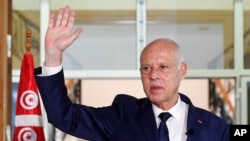Political analysts say a quest for ever-greater power by Tunisian President Kais Saied risks sending the nation back to pre-revolutionary times of "strongman" rule.
On Wednesday, Saied announced changes regarding the coming legislative elections. Tunisians will now vote for individuals instead of lists in a two-round ballot. He also indicated there would be changes to the Independent Electoral Commission, which he said would supervise the election but not with its ''current composition," Reuters reported.
In late March, Saied, 64, dissolved parliament after legislators defied his warning and blocked emergency powers that he granted himself in a bid to take hold of the executive and judiciary, a move criticized as a coup. Saied's government described the parliamentary session as ''illegal'' and said it would launch investigations into those who participated.
Analysts question whether there is any group capable of pushing back against Saied's power grab.
"It is hard to pinpoint any single group with the necessary wherewithal and support" to challenge Saied, said Emiliano Alessandri of the Washington-based Middle East Institute. He said that included opposition parties, which he said suffer from a lack of legitimacy stemming from what he called questionable conduct in recent years.
Pressure from citizenry
But, he said, the overall political environment may trigger a public response to Saied.
''In my view, pressure will build up not because of some political initiative, but when ordinary citizens will see that some of their basic needs – including a better economy and accessible prices – remain unattended to even in the context of the new course. When this happens – and it will not take too long – now-discredited actors will be able to gather fresh new support," he told VOA.
Last July, public fury over poverty, corruption and handling of the pandemic sparked mass protests in this North African nation. Subsequently, Saied suspended parliament and ousted his prime minister and other officials while granting himself extraordinary powers.
In a Facebook post on March 30, Saied said his decision to dissolve parliament was to ''protect the government, the institution and the Tunisian people." He said this at a meeting with the National Security Council shortly after dissolving the legislature.
Aymen Zaghdoudi at the Institute of Press and Information Sciences in the Tunisian capital, Tunis, told VOA the unilateral posture of the Tunisian president was like that of an ''autocratic leader."
''Media freedoms are dwindling, freedom of peaceful assembly is being restricted, and the civil space continues to be narrow. We have seen bloggers, lawyers in jail, and they were prosecuted by military courts, and prosecuting civilians in front of military justice is one of the symbols of dictatorship," he said.
December elections
Saied has set December 17 for legislative elections. Zaghdoudi said per the country's constitution, snap elections must be held within 45 to 90 days, noting that Saied's resolve to adhere to an election date more than seven months from now is unlawful.
''This means he [Saied] will not respect the constitution, but he will follow his own path," Zaghdoudi said.
Ahead of that parliamentary election, Tunisia will hold a constitutional referendum on July 25. Zaghdoudi said about 70% of Tunisians stand with the president. "This is where he gets his legitimacy," the analyst said.
According to Zaghdoudi, events in other nations have made Tunisians wary of foreign interference. He said Saied thrives on these sentiments to ''adopt any unilateral decision despite opposition from the major political and economic elites."
He added that ''to build a solid democracy for the future, we must hold an honest national dialogue that includes all political forces in Tunisia to agree on badly needed economic, political and social reforms.''
This story originated in VOA's English to Africa Service.




